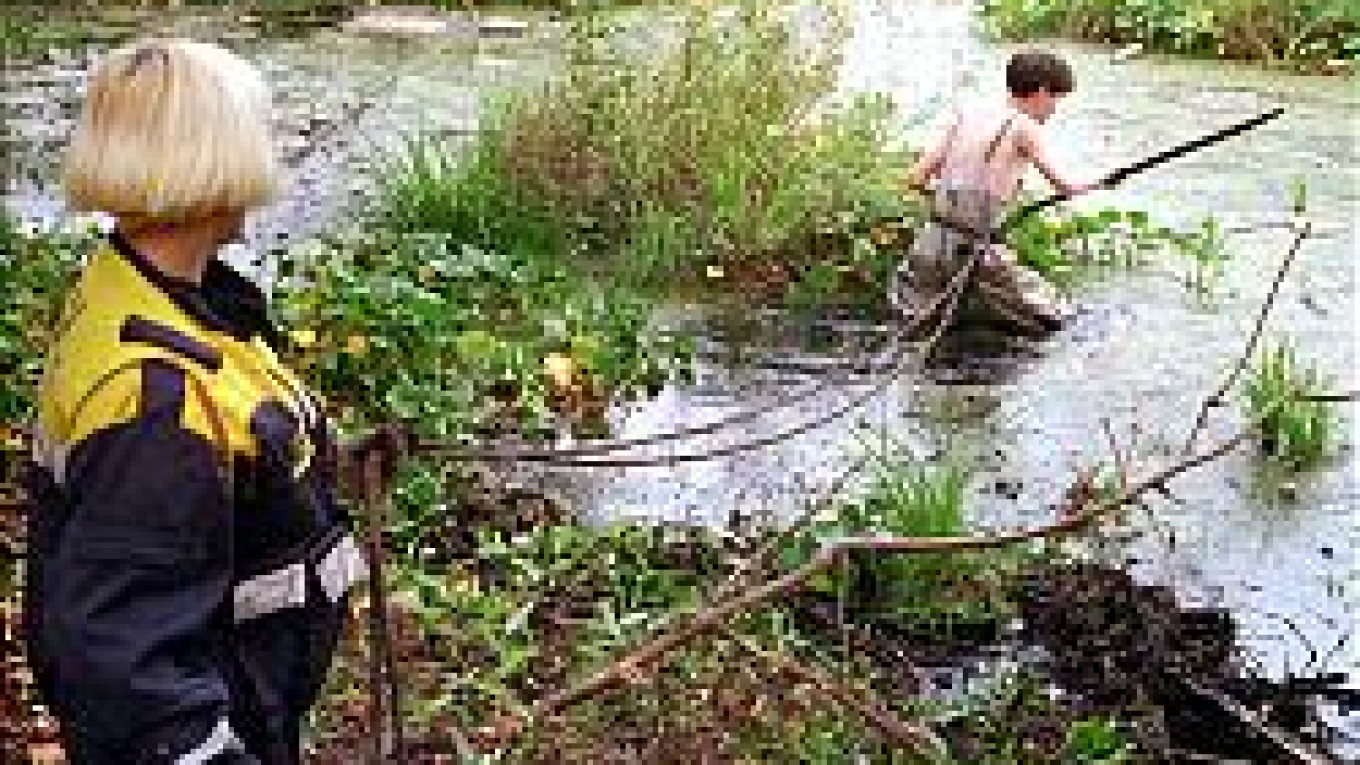But most of the environmental group's work is a lot less dramatic and depends heavily on volunteers.
For Greenpeace's Russian operations particularly, one of the main goals is involving the community in improving the local environment.
In connection with Greenpeace International's Toxics Campaign, the Moscow office has taken on the formidable task of introducing recycling and separated waste management to Russia.
This involves assisting schools and residential buildings build and operate waste sorting stations and alternatives to incinerators.
After helping set up such a center in the Stary Kasino region of Moscow, Greenpeace recently held a major action there to clean up Svyatoye Lake. The lake, which dates from the last Ice Age, had become a dumping ground for everything from plastic bottles to refrigerators and junked cars.
Such an undertaking required as many helping hands as possible from the community that would directly benefit from a cleaner lake. Greenpeace contacted the local authorities to arrange for trucks to cart away the garbage and help with the heavy work, as well as various community and student groups.
Three hundred people -- including school children, students, and elderly neighbors -- showed up, rolled up their sleeves, and spent seven hours of their Saturday picking up trash.
Despite a few young people who balked when handed a pair of gloves and pointed in the direction of a pile of garbage, most pitched in enthusiastically, said Greenpeace spokeswoman Polina Malysheva.
Four girls from school 1161 jumped in, pulling trash out of the water and neatly sorting it into plastics and metals.
"Of course, we wanted to help, it's important," one said.
Across the lake, a group of young people from the local emergency service hauled out wrecked cars and sawed them apart.
College student Anya Maslova heard about the event through the American Council of Teachers of Russian.
She said she had never pictured herself as a Greenpeace activist but was glad she had joined in collecting bottles at the lake.
"I hope that I helped, and I am really looking forward to doing some more volunteer work with Greenpeace," Maslova said.
Even with the volunteers, at the end of the day, there was still work to be done. The job continued the following weekend, with many of the same people returning to help out a second time.
Malysheva called the Svyatoye Lake project a success, not only because the lake is now cleaner, but also because so many people got involved. One community group even called Greenpeace to request help in organizing a clean-up of another nearby lake.
In addition to its full-time staffers, Greenpeace has 100 to 150 volunteers in Moscow, who do everything from assisting with the office work to organizing their own actions.
Most of the volunteers are Russian -- however, foreigners are also welcome -- and can work on projects from fundraising to tree planting. Some of the volunteers also go on to join the office staff.
Another way for people to get involved is through a series of ecological camps, jokingly referred to as the Green Pioneers. The largest in country is the International Ecological Camp at Lake Baikal, run with the assistance of the Dutch and German Greenpeace branches.
Here volunteers can meet like-minded people and cooperate on projects like taking a census of the endangered Nerpa seal.
Valera Plonsky, 18, volunteered with Greenpeace three months ago. He was always interested in biology and ecology in school, and when he heard about Greenpeace on the news, he saw an opportunity to do something.
This summer he investigated logging operations in the Moscow region. When he goes to an eco camp later this fall, he will compare his information with other volunteers' to document the region's deforestation and check the legality of the logging operations.
Greenpeace Russia still depends on financial assistance from branches in other countries, but supporter services coordinator Inna Voronova said the number of individual Russian contributors is steadily growing.
She said the number of supporters doubled in the last few months to 9,000.
Anyone interested in donating time or money to Greenpeace Russia should call the Moscow office at 257-4116, or visit the web site at www.greenpeace.ru. Prospective applicants will be invited to the office to fill in an application and meet with volunteer coordinator Vasily Dalmatov.
A Message from The Moscow Times:
Dear readers,
We are facing unprecedented challenges. Russia's Prosecutor General's Office has designated The Moscow Times as an "undesirable" organization, criminalizing our work and putting our staff at risk of prosecution. This follows our earlier unjust labeling as a "foreign agent."
These actions are direct attempts to silence independent journalism in Russia. The authorities claim our work "discredits the decisions of the Russian leadership." We see things differently: we strive to provide accurate, unbiased reporting on Russia.
We, the journalists of The Moscow Times, refuse to be silenced. But to continue our work, we need your help.
Your support, no matter how small, makes a world of difference. If you can, please support us monthly starting from just $2. It's quick to set up, and every contribution makes a significant impact.
By supporting The Moscow Times, you're defending open, independent journalism in the face of repression. Thank you for standing with us.
Remind me later.


